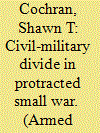| Srl | Item |
| 1 |
ID:
127811


|
|
|
|
|
| Publication |
2014.
|
| Summary/Abstract |
This article examines the basis of military leadership preferences toward war termination, and thus the basis of the associated civil-military divide, within the context of protracted small war. The conventional wisdom posits military leadership preferences as a near-constant in favor of persistence and thus expects a dominant pattern of military obstructionism. However, such a pattern does not hold empirically across the population of small wars. This gap between expectation and evidence derives at least in part from the limits of the bureaucratic-organizational model, focused on the military's desire for resources, autonomy, and influence, that underlies the conventional wisdom. In contrast, this article suggests an alternative model privileging the demands of institutional legitimacy. The legitimacy motive as conceptualized here is particularly salient to the small war context. It accordingly provides a foundation for better understanding variation in military leadership preferences toward war termination and thus variation in the direction and intensity of the civil-military divide.
|
|
|
|
|
|
|
|
|
|
|
|
|
|
|
|
| 2 |
ID:
160235


|
|
|
|
|
| Summary/Abstract |
This article examines the behaviors of political leaders who implement costly and risky measures during wars in which victory has become highly unlikely. It advances two related claims. First, counter to the prevailing logic, leaders with little to no culpability for starting a war remain susceptible to blame and domestic repercussions for how a war ends. Second, with these new leaders, the impetus to avoid blame can prompt risky behaviors that look like gambling for resurrection; but the underlying objectives differ. Through similar behaviors, new leaders do not necessarily hope to salvage victory but instead seek to simultaneously exhibit resolve and demonstrate the futility of further fighting, thus securing support for a less-than-favorable settlement while hedging against domestic punishment. To assess this “bleeding the army” logic as distinct from gambling for resurrection, the article looks at the case of the French Government of National Defense during the Franco-Prussian War.
|
|
|
|
|
|
|
|
|
|
|
|
|
|
|
|